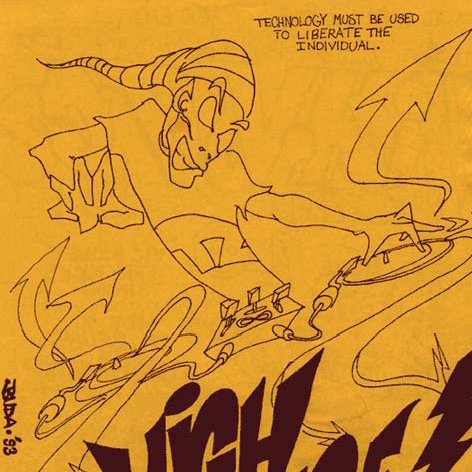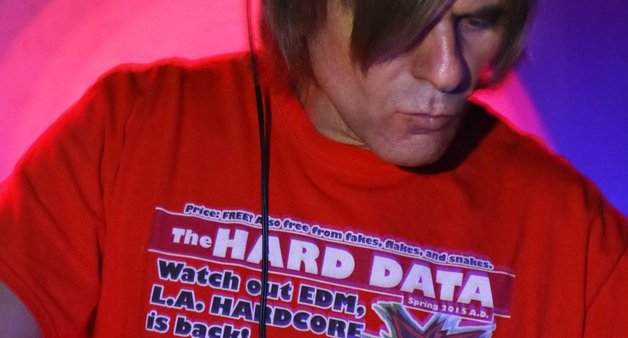Каждый раз, когда микс “Rock the Blockchain” (автор диджей Deadly Buda) проигрывается на платформе Musicoin.org, 15 отдельных музыкальных треков в жанре электронной танцевальной музыки, а также их авторы, в течение нескольких секунд автоматически получают оплату.
Этот микс был завершен в 2:00 13 августа 2017 года, когда Deadly Buda выполнил интеграцию 19 “смарт-контрактов” на блокчейне Musicoin и приложил их к своему диджейскому миксу. “В целом, это кардинальная перемена для любого музыкального жанра, в котором участвует диджей: EDM, Disco, House и Hip-Hop,” – сказал DJ Deadly Buda.

Обложка микса “Rock the Blockchain”. Микс содержит 15 EDM-треков различных жанров: Hard Electronic, Dubstep, Hardstyle, Hard Bass, Jungle, Drum and Bass, Hardcore Techno, Shamancore, Tekno, и Ambient, авторами которых являются музыканты Counterstrike, Satroniq & DJ Delirium, Teknoaidi, Subterranean, Cap, M27, Harhor и Deadly Buda.
С тех пор, как формат диджейских миксов обрел популярность в 1970-е, он до сих пор пребывает в полулегальном состоянии. Поскольку записанный микс является непрерывным сочетанием нескольких отдельных песен или «треков», он требует многочисленных разрешений, документов и лицензий, чтобы стать юридически совместимым. К тому времени, когда необходимые документы готовы, аудитория обычно рассматривает музыку в миксе устаревшей, поскольку в моду уже вошло новое звучание. Следовательно, большинство диджеев на протяжении десятилетий не удосуживались получать разрешения и выпускали миксы «незаконно» на кассетах, компакт-дисках, а теперь на платформах Soundcloud и Youtube. Как правило, основные авторы в этих миксах не получают денег за свою музыку и часто даже не упоминаются в титрах. По этой причине диджеи часто не предоставляют плейлисты, чтобы избежать контроля, ограничений по времени, отсутствия надлежащей маркировки на танцевальных записях или, в худшем случае, хотят все внимание привлечь только к своей персоне.
Как ни странно, танцевальные продюсеры делают свою музыку специально, чтобы на ее основе можно было делать миксы, и призывают популярных диджеев использовать свои песни. Диджейские миксы, зачастую технически незаконные, являются основным каналом рекламы для небольших сцен танцевальной музыки или талантливых исполнителей. Итак, в течение последних нескольких десятилетий музыкальная индустрия вообще не применяла свои авторские права на диджейские миксы, хотя и могла это всегда сделать . Следовательно, диджеи, опасаясь потенциального обвинения, редко могут публиковать свои миксы для большой аудитории или получать гораздо больший доход, чем стоимость записей или Mp3, использованных в миксе. Кумулятивный эффект этой полулегальности заключается в том, что диджейские миксы по-прежнему считаются «андеграундом», хотя аудитория слушателей танцевальной музыки очень хорошо их принимает.
“Чем больше я узнавал о технологии блокчейна, тем отчетливее я понимал, что проблемы с законностью диджейских миксов близки к тому, чтобы уйти в прошлое,” – утверждает DJ Deadly Buda, – все разрешения, документы и платежи могут быть выполнены мгновенно.”

Musicoin это сфокусированная на музыке криптовалюта с возможностью смарт-контрактов.
Технология блокчейна – это, в общем виде, распределенная база данных, поддерживаемая несколькими компьютерами. Самый популярный в мире блокчейн – Биткоин, он вдохновил другие блокчейны нацелиться на конкретные сферы мировой экономики. Musicoin, как следует из названия, ориентирован на музыку, музыкантов и поклонников. Когда пользователь воспроизводит песню на musicoin.org, исполнитель песни получает один Musicoin (стоит около 0,01-0,02 доллара США), и это происходит за считанные секунды.
Система блокчейна Musicoin позволяет музыканту загружать песню и прикладывать так называемый «смарт-контракт», который может распределять платежи нескольким сторонам, если это необходимо. Например, смарт-контракт можно запрограммировать так, чтобы каждый раз, когда играется песня, барабанщик, певец, гитарист и басист в группе получали раздельную оплату.
«Когда я понял, что каждая песня в системе Musicoin имеет свой собственный платежный адрес, я вспомнил множество знакомых музыкантов, делающих отличную музыку, которая подходит для загрузки. Затем я попросил разрешения использовать их музыку в моем миксе, – сказал Deadly Buda. – После встречи с некоторыми из музыкантов было решено использовать следующую формулу: 40% дохода от микширования поступает диджею, а 60% равномерно распределяются между песнями в миксе. Диджей проводит много времени, просеивая кучу музыки, чтобы найти драгоценные камни, которые затем он или она играет для публики, поэтому я хотел одновременно учесть эти трудозатраты и расходы, в то же время оставив достаточно места для каждой песни, чтобы она могла заработать деньги ».

DJ Deadly Buda выпустил первый в мире диджейский микс с использованием блокчейна.
Новая парадигма создания и оплаты диджейских миксов теперь официально существует благодаря DJ Deadly Buda и Musicoin, “но предстоит еще много работы, – говорит Deadly Buda. – В самом ближайшем будущем, вероятно, появится только одно поле для ввода данных, которое сможет использовать музыкант и которое даст всем участникам системы право на микширование их музыки, поскольку она будет оплачиваться через смарт-контракт. Как только это произойдет, систему уже невозможно будет остановить, она принесет огромную пользу как существующей музыкальной индустрии, так и новым музыкантам.”









